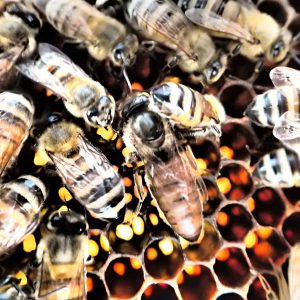The incredible honey bee
There is nothing quite like a the honey bee. They are one of natures great pollinators. While doing that job they store wonderful honey. They also store pollen, form propolis and they produce something called royal jelly. Last but not least, their home is an intricate design of perfectly made wax hexagons. They are master engineers. All of these things are products of the honeybee.
The busy bee
The word on the street is honey bees pollinate up to one third of each bite of food we eat. They also pollinate plants like alfalfa and other plants which are food for the beef and other animals we eat. Blueberries, almonds, and anything in the melon and squash family need insect pollination to produce fruits. These plants are just the tip of the iceberg. Many other plants such as tomatoes, will produce much better when pollinated by honey bees. Pollination services are estimated to be worth 20 billion dollars a year in the United States alone.

Other Honey bee stuff
We know about honey, but products like pollen from flowers are collected by beekeepers at the entrance of the hive in special pollen traps. Pollen can be sold as a nutritional protein source for humans. Propolis, a sticky tree sap substance, is collected by bees and turned into a sealant in the honeybee hive. Propolis is collected by beekeepers and sold as a medicinal supplement for it’s anti-microbial action. Honey bee wax is used in making candles as well as soaps, hand lotions and lip balms. Royal jelly, a special substance produced in a gland in the head of a honey bee is used to feed the youngest bee babies or larvae in the hive. A queen bee, however, is raised solely on Royal Jelly. Because of this she forms 4 days faster than a worker bee. This is despite the fact that she is much larger. She also will live much longer, thanks to being fed this special substance. A worker bee lives around 45 days. A queen honey bee has been recorded to live as long 10 years although 2 to 3 years is more common. Royal Jelly is sold in health food stores, after tediously gathered with small spoons or vacuums. It is sold as a supplement for people hoping to take advantage of its secrets of longevity.
Raising Bees
Beekeeping isn’t for everyone. If you are allergic to stings, beekeeping is not recommended. There is work involved and once you take to the endeavor you might get hooked. Bees, like livestock, need to be watched and cared for. The reward is the golden honey and the business opportunities are can be abundant.
A beekeeping community
The Heartland Beekeepers Association is a local group in Central Florida that meets and helps those interested in becoming beekeepers. A beekeeping class is being offered by Heartland Beekeepers in coordination with the University of Florida’s Institute of Food and Agricultural Sciences Extension, Highlands County. The class takes place Saturday, September 14th in Sebring, at the Bert Harris Agricultural Center. Attendees will learn about bees, setting up an apiary, and managing them. You can learn more about the class and purchase tickets for the class here.
Keep in touch!
Find me on Facebook at Hometown Gardener Sign up for our Master Gardener Newsletter Here.
Join our Facebook groups, Heartland Beekeepers, Highlands County Master Gardeners, Science Based Florida Gardening Answers and Central Florida Butterfly and Pollinator Club. Read my other blogs by clicking here.
Watch the Trailer for our November 16th, 2019 Garden Festival and Plant Sale Festival!
 0
0
